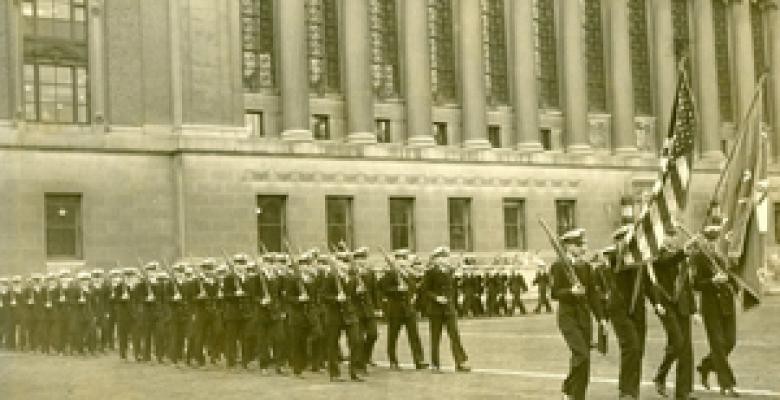NROTC Prepares for Re-launch

The newly reinstated Naval Reserve Officers Training Corps (NROTC) will be open to Columbia undergraduates as early as the start of the spring 2012 semester, and the program will be fully implemented by next fall.
The Office of the Provost recently appointed an advisory committee to guide the program’s roll-out. Representatives from the State University of New York, Maritime, in Throgs Neck, N.Y. where Columbia cadets will receive military training, visited campus in early December to discuss careers in leadership in the Navy and Marines, as well as opportunities for financial aid.
The committee, chaired by Jeffrey Kysar, a professor of mechanical engineering, will convene monthly and work with University faculty to determine if any of the courses taken at SUNY Maritime should also qualify for credit at Columbia. ROTC participants, who must report to the SUNY campus in the Bronx twice a week, will study naval history and sciences, navigation, leadership, ethics and military customs, in addition to rigorous physical training.
“We want NROTC to get off to a very strong start,” said Kysar. “We’re here to make sure students can begin taking advantage of this opportunity, while ensuring that our high academic standards are met.”
Captain Matthew Loughlin, a SUNY Maritime professor, discussed NROTC with about 10 students during a Dec. 6 information session at the Morningside campus. Current Columbia undergraduate students and high school seniors admitted for next year may obtain federal scholarships for their college tuition in exchange for a commitment to post-graduation military service. Roughly 900 scholarships are available nationwide, and Loughlin said some Columbians are already in the running.
Current freshmen and sophomores who want to begin NROTC in the spring semester can apply directly to the SUNY Maritime unit. This non-scholarship route includes a stipend and puts students on a path to service as active duty officers after graduation.
College students already enlisted in the Navy can take advantage of the NROTC’s Seaman to Admiral Program, which trains sailors to become officers while providing financial aid for college. Loughlin said two active-duty sailors from the School of General Studies have already been accepted. A similar program is also offered to active duty Marines.
Columbia has a long history of educational programming with the U.S. military and the Navy in particular, including a Midshipmen’s School that trained more than 20,000 officer candidates for duty during World War II. The University’s formal NROTC agreement dissolved in 1969 amid anti-war protests but was revived this year after the repeal of “Don’t Ask, Don’t Tell” went into effect, allowing gays and lesbians to serve openly in the military.
Today, more student veterans—nearly 400—are enrolled at Columbia than any other school in the Ivy League, said Vice Provost Stephen Rittenberg. The School of General Studies oversees the University’s Yellow Ribbon Program, which supports education for veterans of the wars in Iraq and Afghanistan. And a handful of undergraduates participate in the Army and Air Force ROTC programs at Fordham University and Manhattan College, respectively.
The NROTC at SUNY Maritime, the fifth-largest unit in the country, has 165 cadets—full-time SUNY Maritime students, as well as participants from Fordham University and Molloy College on Long Island. Rittenberg noted, “This is also a unique opportunity for the University to attract a different kind of undergraduate student.”
The provost’s advisory committee includes history professors Kenneth Jackson and Elizabeth Blackmar; Leora Brovman, assistant dean for undergraduate student affairs at the engineering school; sociology professor Thomas DiPrete; Patricia Grieve, the Nancy and Jeffrey Marcus Professor in the Humanities; Curtis Rodgers, dean of enrollment management at the School of General Studies; Eduardo Santana (CC’13); Mi Wang (GSAS’13); and Kathryn Yatrakis, the academic dean at Columbia College and senior associate vice president for Arts and Sciences.
“The military is going to benefit from having this cadre of folks ascending to leadership,” said Loughlin, “and it’s of strategic benefit to the United States to have Ivy League-educated officers serving our country in uniform.